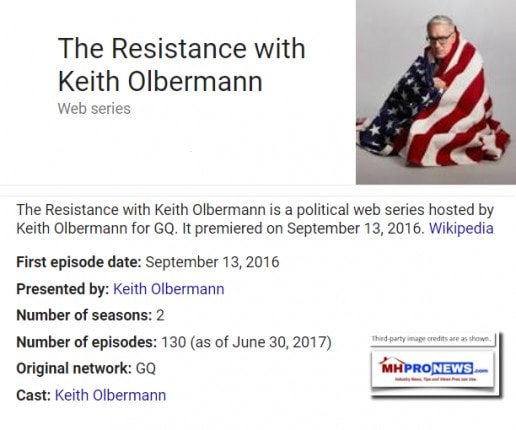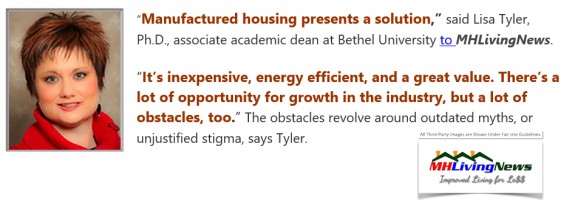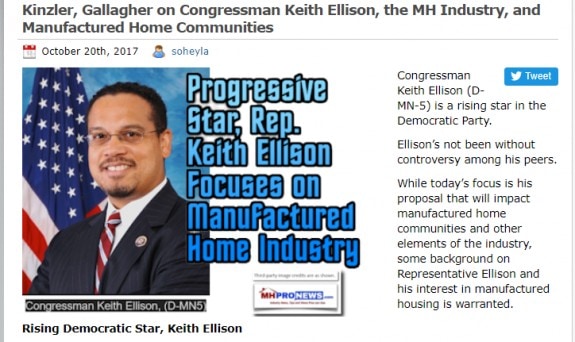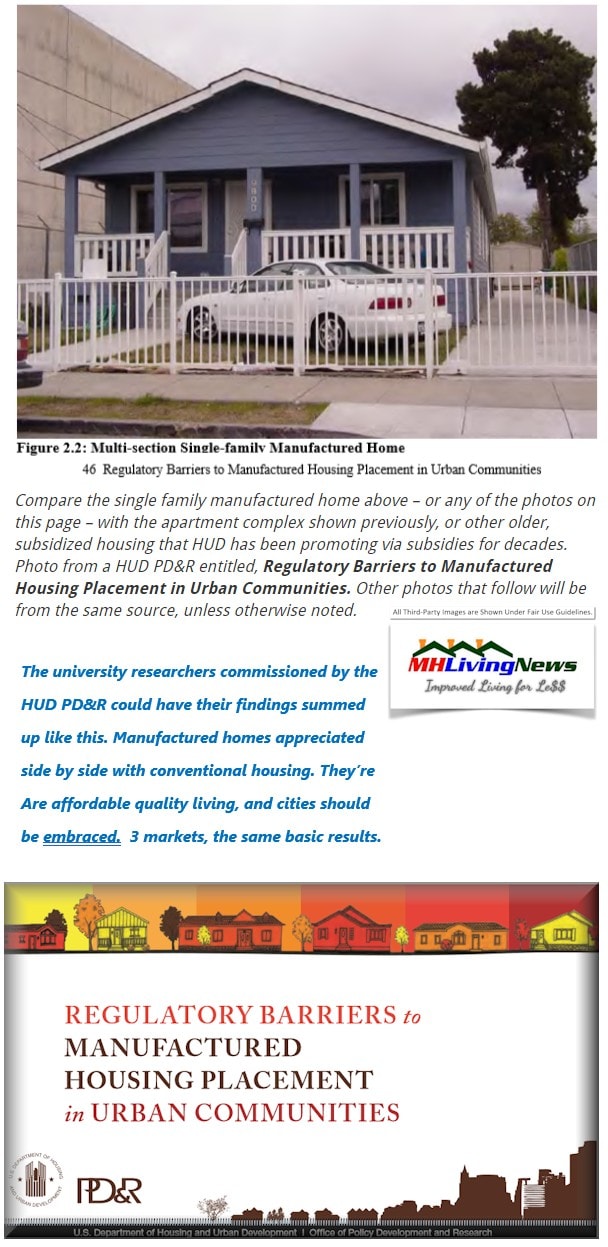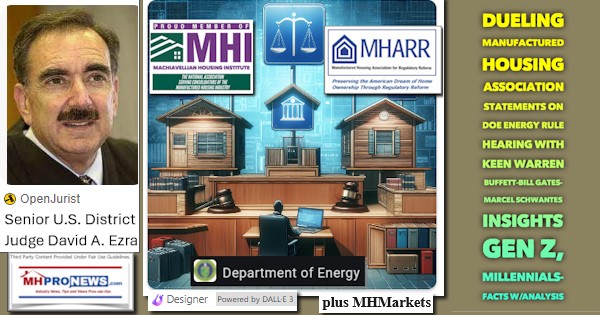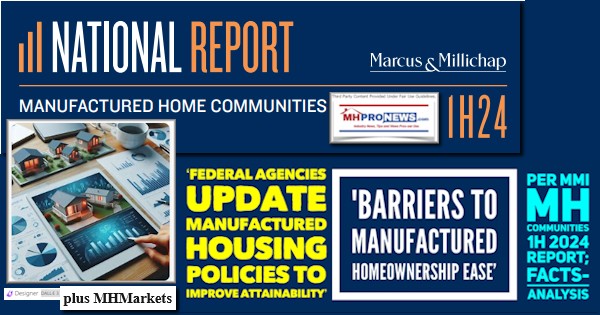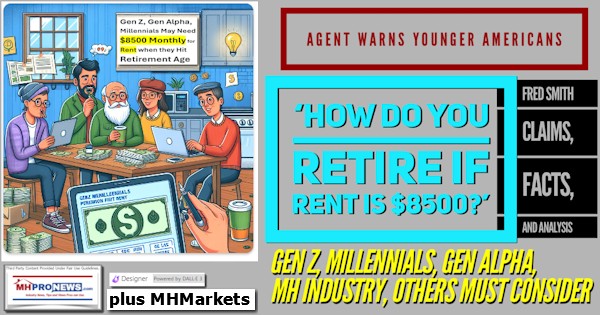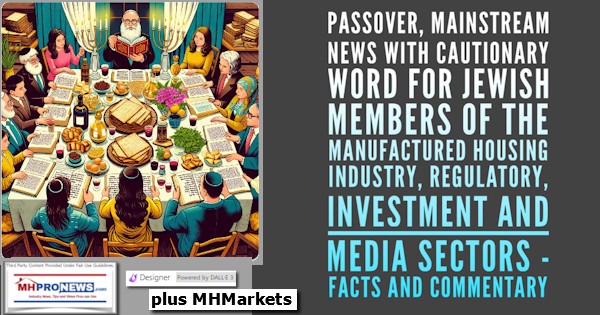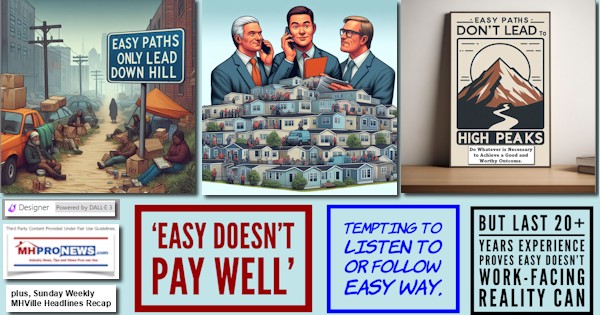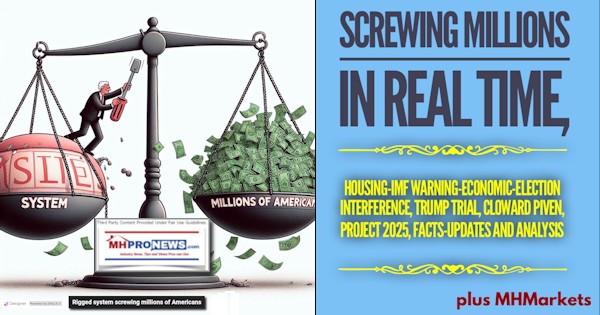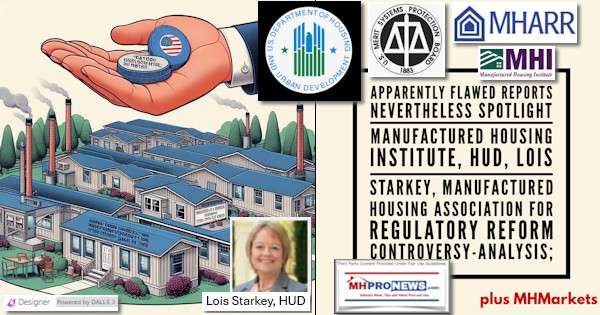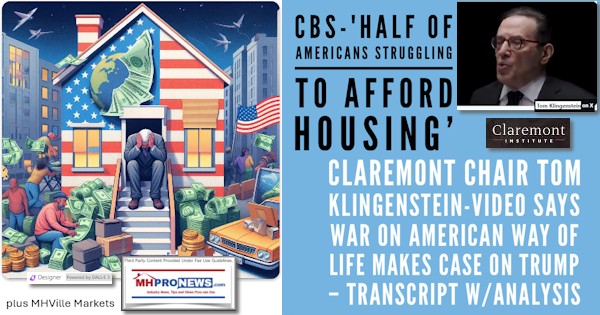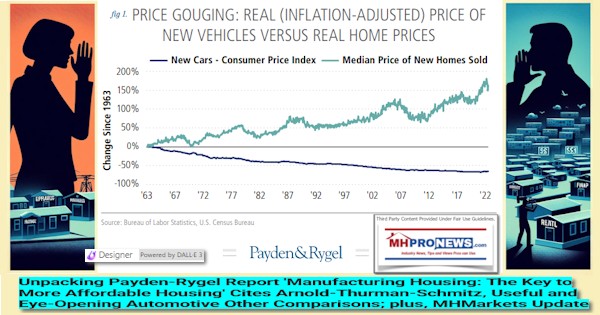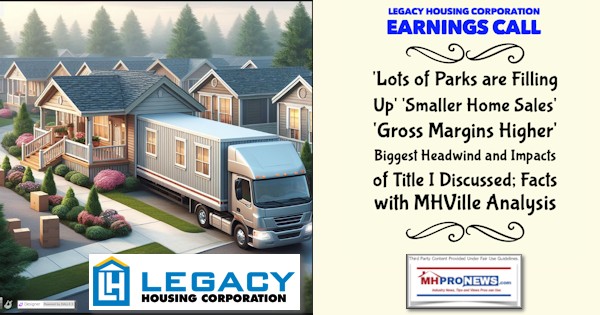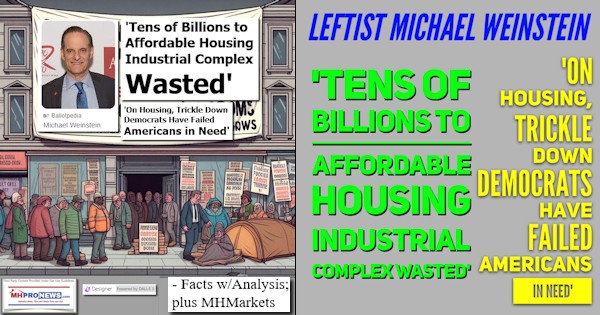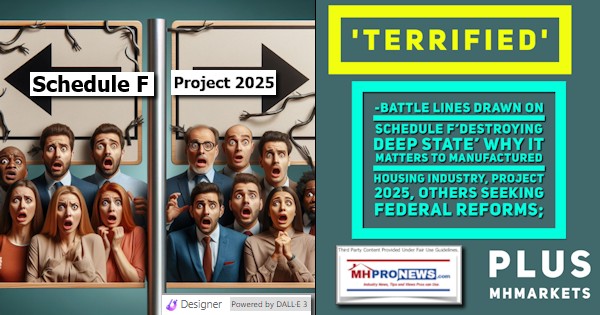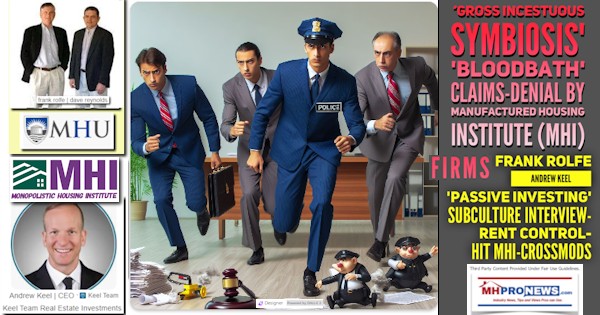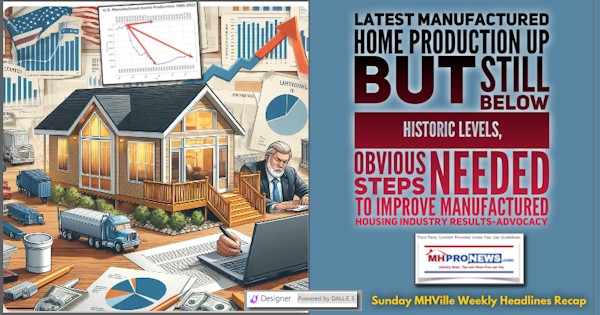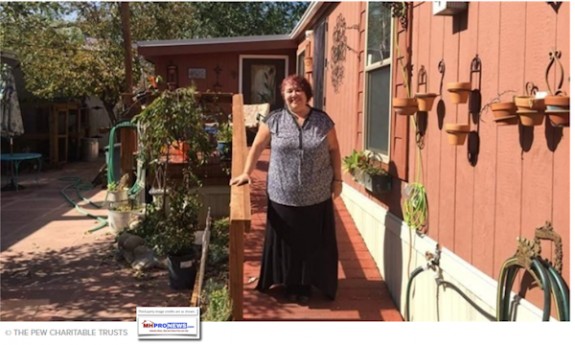
When it was initially published, their headline read:
“Why Some Cities Are Buying Trailer Parks” [sic].
Several hours later, they softened that headline to read:
“Why Some Cities Are Buying Mobile Home Parks” [sic];
perhaps their editor/writer was still ignorant of – or ignored the fact – that no mobile homes have been built in the U.S. in over 41 years.

Beyond the HuffPo’s numerous terminological missteps, that error didn’t keep veteran Stateline/Pew writer Sophie Quinton from plowing ahead with her report on why in “In Boulder, Colorado, and other places where affordable housing is scarce, city leaders are trying to preserve mobile home parks. [sic]”

Changing their Title, But Not the HuffPo Content…
“Isabel Sanchez lives in a trailer park [sic] in Boulder, Colorado. Around the country cities like Boulder have turned to trailer parks [sic] to provide affordable housing to their low- and middle-income populations,” opens Quinton after the HuffPo title and subtitle.
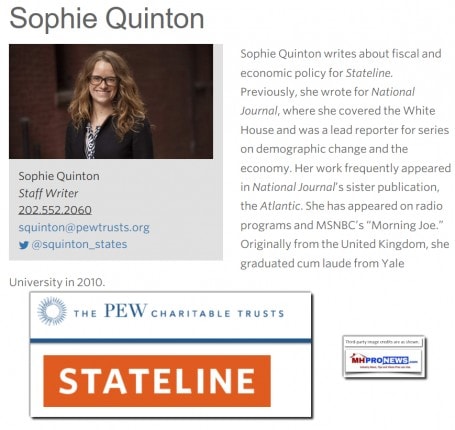
“The mobile home park [sic] Sanchez and her family live in offers a glimpse of Boulder’s hippie past. Small houses and trailers [sic], many dating to the 1960s and ’70s, sit close together on tree-lined streets. “I love the space, I love the location, I love the community here,” Sanchez, 55, said recently, relaxing in a blue armchair in her spotless living room.”
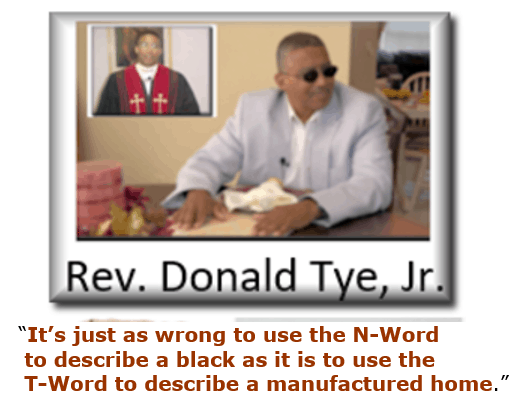
Herein lies the irony of good progressives, who deserve the initial benefit of the doubt in their sincerity.
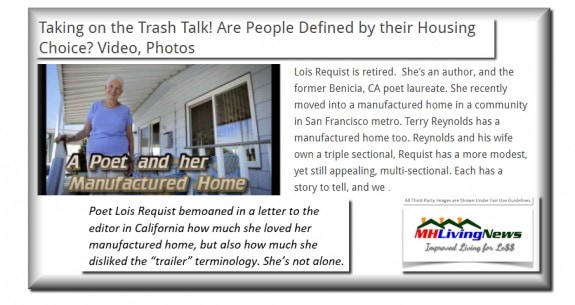
Progressives may well recognize the value of manufactured home communities. But just as Prosperity Now/formerly CFED uses the correct nomenclature – which is also more respectful to home owners – shouldn’t Quinton and others do likewise?
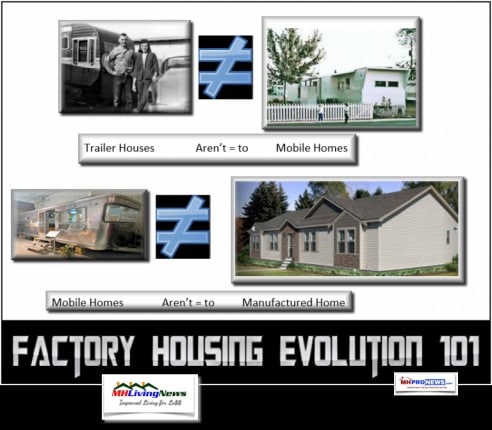
But some liberals and others may not always realize that stated or not, manufactured home owners don’t want to be stereotyped as “trailer park trash,” as left-leaning web host The Resistance with Keith Olbermann used the phrase earlier this year about Kid Rock, Sarah Palin, and Ted Nugent.
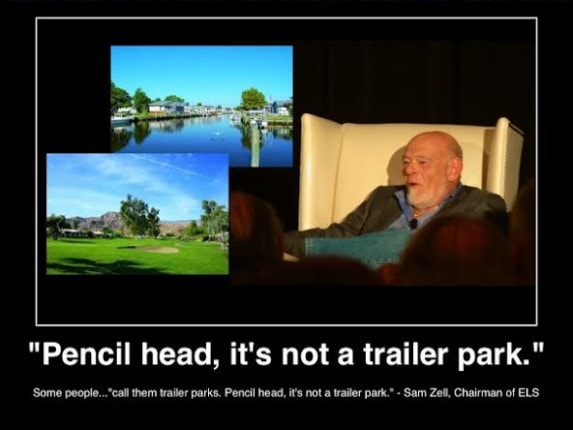
Because the home Isabel Sanchez is proudly photographed in front of is clearly not a mobile home, much less a trailer house. The visuals alone suggest Sanchez’s home is a modern manufactured home.

Sophie Quinto’s Take on the Affordable Housing Crisis
“Affordable neighborhoods like these have become hard to find in Boulder and cities across the country where home prices are soaring,” observes Quinto.
“In some metro areas, rising prices are prompting park owners to sell their land to developers, affordable housing advocates say. “When the mortgage crisis came about it sort of slowed down, and now it’s heating up again,” said Carolyn Carter, deputy director of the National Consumer Law Center,” the Stateline/HuffPo column said.
A Common Problem with Progressive/Liberal Economic Policies
Rather than look for the true underlying causes of rising land prices – which include, for example:
- zoning out new manufactured home communities, or
- zoning out the placement of manufactured homes on scattered infill lots
– what some progressives look for is their favorite solution.
That leftist solution? The governmental option, instead of a free market one.
Another common progressive challenge is revealed in their failure to even reveal the free market option. So they present instead their pet solution, their let’s turn to more government solution.
As Quinton puts it:
“Affordable housing advocates say that the best way to preserve mobile home parks is to turn them into co-operatives owned by residents. But in Boulder, land is so valuable — and parks need so many infrastructure upgrades — that it wouldn’t be possible for low-income residents to finance the purchase alone.”
Or as the Stateline/HuffPo writer also said:
“Colorado state Sen. John Kefalas, a Democrat, has been trying to pass a law that would make it easier for residents of the state’s mobile home parks to purchase their communities. His latest iteration, which was defeated in committee this year, would have created tax credits to reward owners who sold to residents.
The manufactured home industry opposed the bill, describing it as intrusive and unnecessary. Kefalas says he plans to try again next year. For now, it’s technically possible for Colorado mobile home residents to band together to buy the park they live in, he said. It’s just never happened.”
That sounds similar to what Congressman Keith Ellison (D-MN) has proposed nationally. Ellison’s bill has drawn support and criticism from the ranks of those in manufactured housing industry.
Resident owned communities are indeed a valid option. As ROC USA structures their deals, they are commercially competitive, and they operate in a business-like, professional fashion.
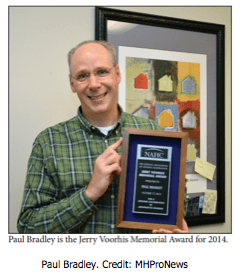
That professional/commercial tilt has contributed to ROC USA’s positive outcomes for residents and sustainability, with all of their cooperatives to date being successful. But it should be noted that for economic reasons, some ROCs have to raise site fees (a.k.a. ‘lot rent’) upon cl9sing for the same reason that private investor/owners do. Namely, to fund upgrades and repairs. Paul Bradley, ROC USA president and CEO has acknowledged in writing and video that there are many good operations in the industry among privately owned operations.
So, what Quinton’s commentary fails to note at all is the cause and effect of how
- NIMBY, and
- zoning policies that hinder or practically stop the placement of manufactured homes,
- often results in what is seen in Boulder, San Francisco, or hundreds of other markets nationwide, where anti-free market policies are implemented.
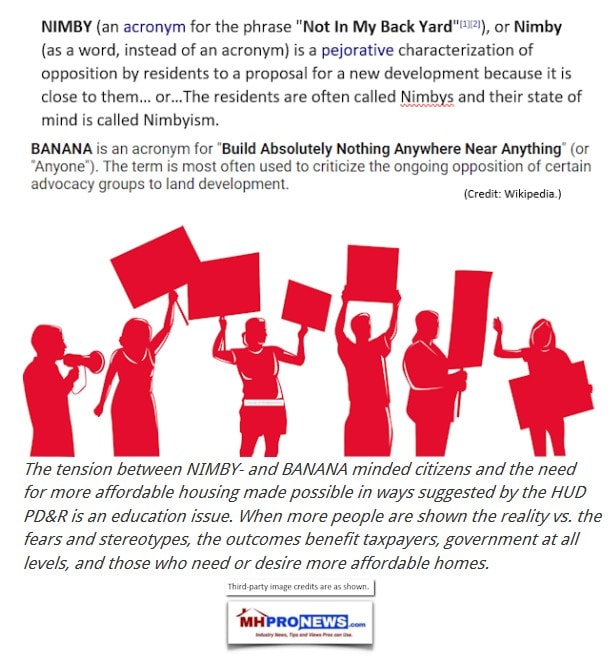
Skyrocketing Prices
The laws of real estate, supply and demand aren’t stopped by the bigger government crowd.
Rather, those policies fuel or create potentially avoidable economic disruptions, by precisely by keeping the free market from operating properly.
The free market keeps prices down naturally, through competition. The more new manufactured home communities that could open in a given market, the lower the site fees would be for other communities in the area. Zoning out manufactured home communities arguably forces all community – and other competing housing prices – higher.
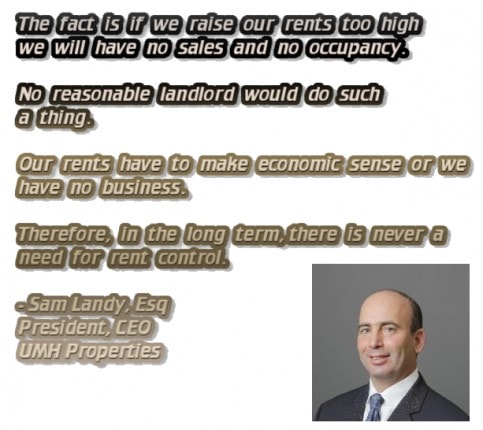
Or another classic example is Houston, where zoning is easier for builders, thus the cost of housing is lower than other markets where zoning is more stringent.
Here too is where terminology comes in. Given that Quinton wrote, “The Manufactured Housing Institute, an industry group, said it doesn’t appear that parks are closing down more often today than in the past,” one might hope she was at least exposed to the proper terminology, even if Quinton shunned using the right words, at the right time.
City planners and public officials often don’t want to have ‘trailers’ and ‘mobile homes’ in their communities.
Using those terms scares residents, who fear depreciation of their conventional homes. As an aside, this among the reasons why from day one, MHProNews and later MHLivingNews have promoted a proper use and understanding of terminology; it benefits home owners, professionals and those looking in by avoiding the stigma attached to the T-word, or to the phrase, “mobile home.”
But what the university level research revealed by the HUD PD&R – found in the article linked here – demonstrates that manufactured homes and conventional housing can appreciate side-by-side with conventional homes.
To rephrase, the common FEAR is “False Evidence Appearing Real.”
The reason? Again, supply and demand, and the standard market realities real estate.
Elected official James Hanning Describes His Experiences
with Manufactured Homes in the video above.
Objectively, one could demonstrate that every challenge Quinton mentioned in her column flowed from one or more flawed premise.
As Jay Hamilton – the executive director of the Georgia Manufactured Housing Association has said of community closures – they’re often the result of rising land prices, rising taxes, etc. Had the correct zoning and infill lot policies been in place, common sense suggests that costs would be kept lower.
Quinton cites Prosperity Now – which does use the proper terminology, and recognizes the value of manufactured homes for affordable ownership and potential wealth building. When D.C. based Prosperity Now (formerly, CFED) says there is a high cost of moving a home, that’s true.
But the cost of moving would also be irrelevant is homes can be sold where they are, as occurs with other forms of housing. You can argue that it would cost far more to move a site built house, but how often do you want to do either one?
HUD is rarely mentioned in these stories as a cause or irritant for the problem.
The Manufactured Housing Association for Regulatory Reform (MHARR) has pointed out for years, that a proper implementation of the “enhanced preemption” required by the Manufactured Housing Improvement Act of 2000 (MHIA 2000) could head off many of these issues. Local zoning boards wouldn’t be rushing to zone out manufactured homes — but only if federal officials at HUD applied the laws that are already on the books, that would prevent anti-manufactured home placement from occuring.
Quinton is clearly gifted, as her LinkedIn profile suggests. She no doubt has the ability to learn, and pivot, which we hope to encourage. The balance of Quinton’s well written, but economically and terminologically problematic article, is linked here.

The Lessons?
The manufactured home industry must define itself or others will define us, often to the disadvantage of home owners, and professionals alike.
When problematic articles are published, the industry ought to respond in the best ways available.
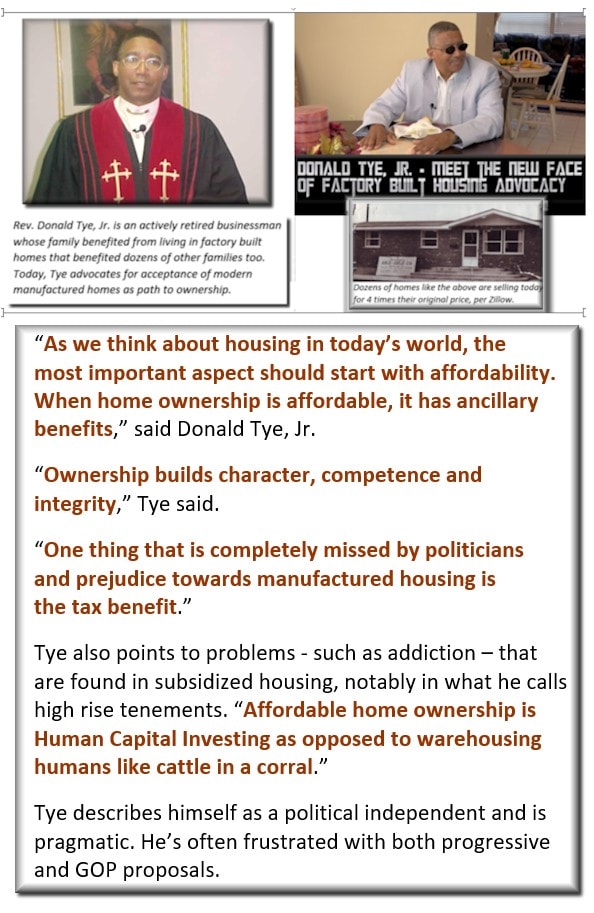
Some response is better than no response.
Until the problematic patterns that have dogged the manufactured home industry are sufficiently challenged, nothing will be changed. When it comes to media, that means holding them accountable for proper terminology, and a more balanced approach to their writing.
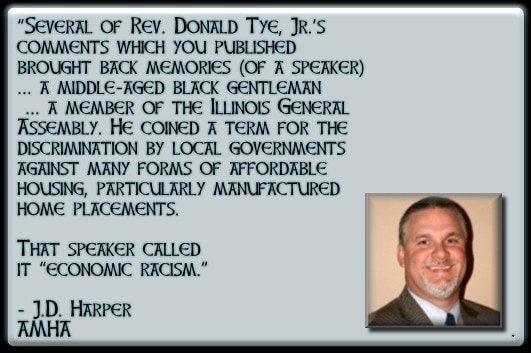
Fisking isn’t personal.

A good critique – or analysis – is professional. It’s academic.
A robust discussion and analysis are precisely the ways for the truth to be revealed. ## (News, fisking/analysis, commentary.)
(Image credits are as shown above, and when provided by third parties, are shared under fair use guidelines.)



